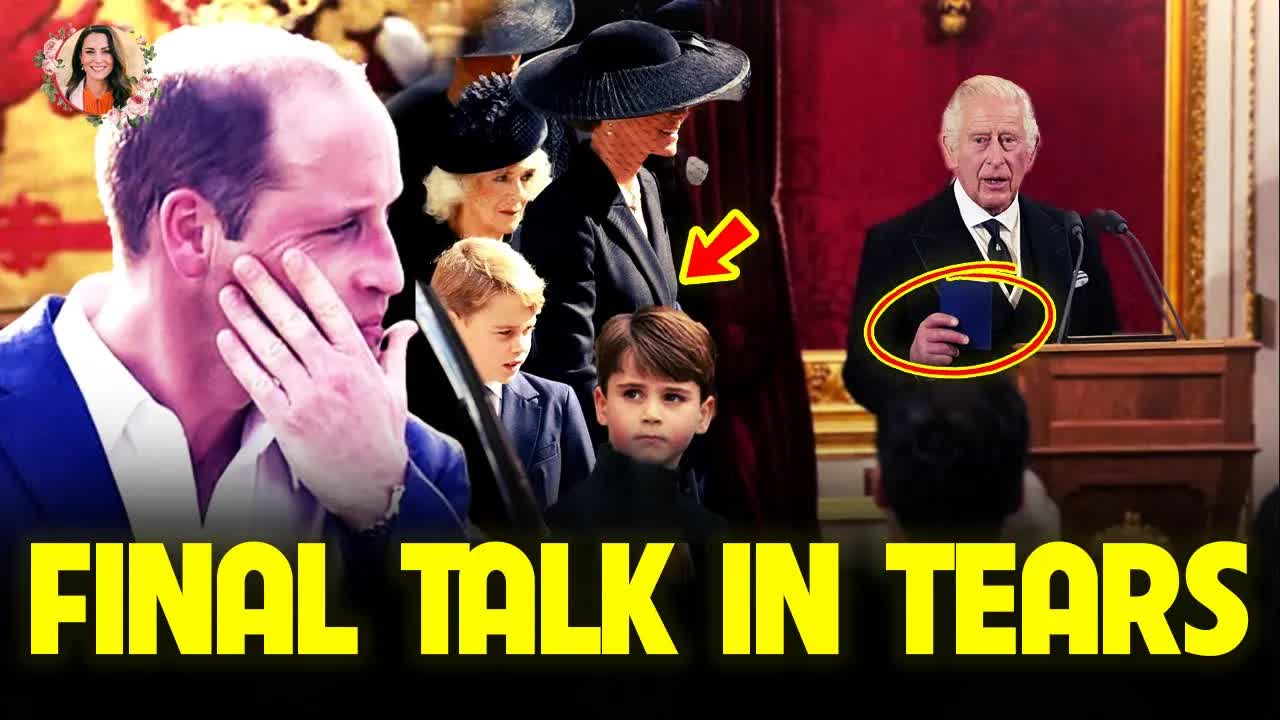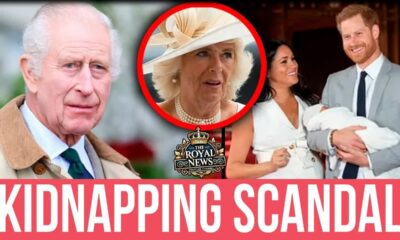Must Read
King Charles’ Monarchy Plans Stir Controversy Amid Family Concerns
In the wake of summer holidays spent at Balmoral, King Charles is facing pushback regarding his vision for a streamlined monarchy.
The upcoming royal meeting promises to tackle significant issues, including the future of young Prince George.
Reports suggest that the Prince and Princess of Wales are not fully on board with their father's proposals, expressing concerns over the potential stress these changes may place on their children.
The crux of the matter lies in King Charles' ambitious plans to reduce the size of the working royal family.
This approach could lead to increased responsibilities for Prince George and his siblings, as they might be thrust into various royal duties to meet the demands of a smaller group.
The couple fears that such expectations could overwhelm their children, forcing them into a life filled with royal obligations.
Among the notable changes is a new directive requiring Prince George to travel independently, regardless of the situation.
As he approaches his twelfth birthday, he will also need to consider whether to attend a boarding school, a decision that carries significant weight.
To help him navigate these challenges, the royal family plans to assign a mentor who will guide him through this transition, ensuring he meets the rigorous standards expected of him as a future king.
One of the longstanding traditions that complicate this scenario is the protocol that prohibits members of the royal succession from traveling together.
This rule aims to safeguard the monarchy's continuity in case of an unforeseen tragedy.
However, it has caused considerable anxiety for Catherine, who values the importance of keeping her family close and united.
Royal commentators have noted that while these safety measures are rooted in tradition, the emotional toll on the family should not be disregarded.
King Charles envisioned a more streamlined monarchy to alleviate the financial burden on British taxpayers, yet this plan inadvertently leaves the heir to the throne with fewer family members to rely on during difficult times.
It's essential to remember that George, Charlotte, and Louis are still quite young, meaning it will be a decade or more before they truly engage in royal duties.
This reality adds another layer of complexity to King Charles' plan, particularly as the Wales family grapples with the added challenges stemming from Catherine's cancer treatment.
The inclusion of extended family members, such as Mike and Zara Tindall, along with their children, could provide much-needed support.
These potential additions to the working royal roster may help distribute responsibilities more evenly, easing the load on the core family members.
This shift in royal dynamics marks a significant departure from the era of Queen Elizabeth II, who had a larger pool of working royals to keep the schedule running smoothly.
While she was a cherished figure, even she recognized the challenges that come with such an all-consuming role.
In 1992, she candidly remarked that most people have jobs and then return home, highlighting the demanding nature of royal duties.
Queen Elizabeth faced personal trials, including the loss of her mother and sister, which threatened to overshadow her long reign.
Acknowledging the fragility of public sympathy, she understood the importance of being visible and engaged with her subjects.
Her great-great-grandmother, Queen Victoria, had experienced a similar fate, retreating from public life after her husband's death, leading to a decline in public affection.
The royal family's mantra of duty above all else often clashes with the priorities of everyday people, who would likely prioritize family above all else.
The Waleses have taken a gentler approach to parenting, aiming to envelop their children in love and support during uncertain times.
Prince George, despite his royal status, exhibits signs of anxiety in public settings.
In moments of distress, his father, William, offers reassurance, demonstrating the family's commitment to nurturing their children.
William has expressed concern about the environmental legacy his children will inherit, especially given George's sensitivity to issues like animal extinction.
Through experiences like litter-picking in Battersea, the young prince is gaining awareness of environmental issues, a cause that both he and his father are passionate about.
As the royal family navigates these changes, the balance between tradition and modern parenting continues to evolve, reflecting the complexities of royal life in contemporary society.
NEXTNEXT
King Charles' Monarchy Reforms Face Family Resistance Amid Growing Concerns
In the wake of King Charles III's ambitious plans to streamline the monarchy, tensions are brewing within the royal family.
Following their recent summer retreat at Balmoral, the royal household is gearing up for a critical meeting to discuss pressing issues, including the future role of young Prince George.
However, it appears that the Prince and Princess of Wales are not entirely on board with their father's vision, raising concerns about the potential stress these changes might impose on their children.
The apprehension stems from the belief that a simplified monarchy could lead to increased demands on George, Charlotte, and Louis.
The couple fears that their children may be thrust into a whirlwind of royal duties, stretching their young lives thin as they strive to meet the expectations of a more compact royal family.
King Charles' reforms are indeed significant, particularly with new expectations for Prince George, who will now be required to travel independently, regardless of the circumstances.
As the heir apparent approaches his twelfth birthday, he will also face the pivotal decision of whether to attend a boarding school.
To help him navigate these responsibilities, the royal family intends to appoint a mentor who will guide him through this transition.
This initiative aims to prepare George for the weighty responsibilities that lie ahead while adhering to the traditional protocols that have long governed the monarchy.
One such protocol is the longstanding rule that prohibits royal heirs from traveling together.
This measure, designed to safeguard the monarchy's continuity in the event of a tragedy, has become a source of considerable anxiety for Catherine, who values the importance of family unity.
Royal experts have noted that while these safety measures have historical significance, their emotional toll on the family should not be underestimated.
King Charles' vision for a leaner monarchy was initially intended to alleviate the financial burden on British taxpayers.
Yet, a byproduct of this plan is that the heir to the throne finds himself with fewer family members to rely on during challenging times.
With George, Charlotte, and Louis still quite young, it will likely be a decade or more before they begin taking on formal engagements, further complicating the execution of Charles' strategy.
The challenges of implementing this vision have been exacerbated by the personal trials faced by the Wales family, particularly as Catherine undergoes chemotherapy for cancer.
In light of these difficulties, there is speculation about potentially expanding the working royal roster to include relatives like Mike and Zara Tindall, as well as Princess Eugenie and Lady Louise Windsor.
Such additions could help distribute responsibilities more evenly, alleviating some of the pressures on the core royal family.
This situation marks a notable departure from the past, especially when considering the reign of Queen Elizabeth II, who benefited from a larger pool of working royals to manage the demands of royal life.
The late queen, while beloved, openly acknowledged the challenges of her extensive role, famously remarking that most people have jobs they can leave at the end of the day.
Reflecting on her own family's history, Queen Elizabeth understood the delicate balance of public sentiment.
She was acutely aware that sympathy from the public could swiftly turn to disdain, as evidenced by her great-great-grandmother, Queen Victoria, who withdrew from public life for a decade after her husband's death.
Elizabeth's ability to maintain public affection was bolstered by large-scale celebrations and the unwavering support of her family.
In the royal narrative, duty often takes precedence, yet for many ordinary people, family remains the ultimate priority.
The Wales family has embraced a nurturing approach to parenting, ensuring their children feel enveloped in love and support amid the uncertainties of royal life.
Prince George, despite his royal status, exhibits signs of anxiety in public settings.
His father, Prince William, often reassures him with gentle gestures, demonstrating a compassionate parenting style.
There have even been moments when young George expressed distress over environmental issues, asking to turn off a nature documentary due to its portrayal of animal extinction.
William shares his concerns about the world his children will inherit, fearing that discussions around climate change will continue to haunt future generations if action isn't taken soon.
His son's experience with litter-picking at school has already instilled a sense of environmental awareness in him, showcasing the impact of their family's commitment to sustainability.




































